Disability rights activists call for urgent restoration of Dial-a-Ride services
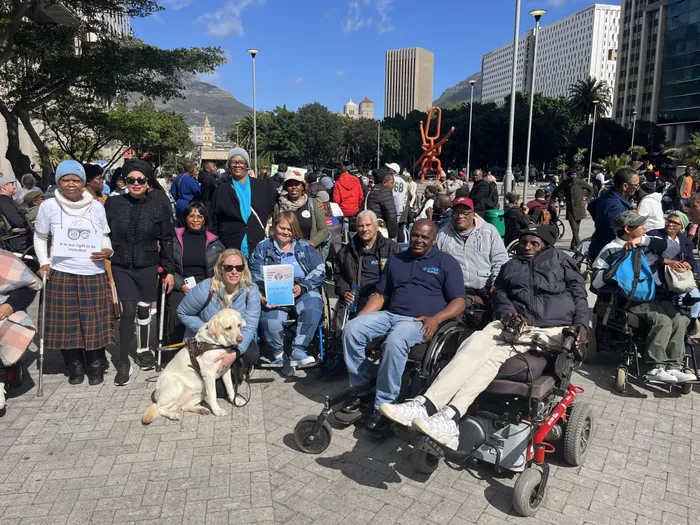
People with various disabilities demand the return of Dial-a-Ride services during a protest at the Civic Centre on Monday August 25.
Image: Fouzia Van Der Fort
Activists with disabilities rallied for the immediate restoration of the Dial-A-Ride (DaR) service, highlighting the critical need for accessible transport in their daily lives.
They expressed their frustration at not being able to access schools, healthcare, work, and other basic rights without the DaR service during a gathering at the Cape Town Civic Centre on Monday, August 25.
This follows the City of Cape Town’s announcement that, due to budget constraints, the DaR service will be limited to transporting eligible wheelchair users and those with severe walking impairments between their homes and workplaces.
As of Monday, September 8, the City said it will transport eligible wheelchair users and those with severe walking impairments between their places of work and home only.
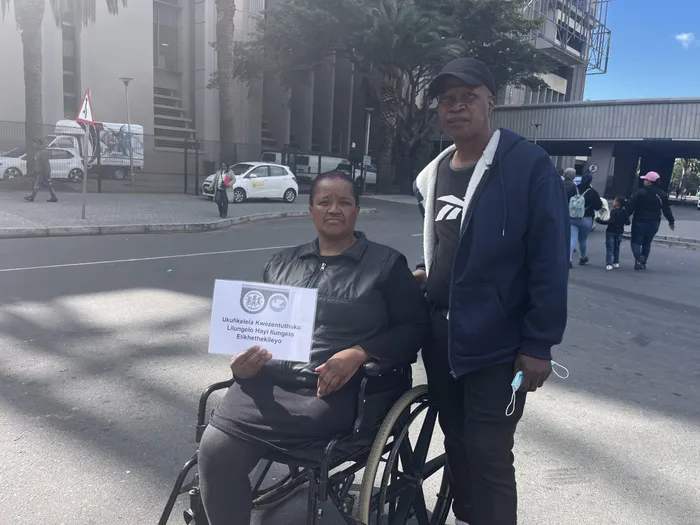
Nontsikelelo Mosoluli and her partner Boyce Baloti, from Khayelitsha, outside of the Civic Centre. Her poster reads: "Access to development. It's a right not a privilege".
Image: Fouzia Van Der Fort
Nontsikelelo Mosoluli, 55, of Khayelitsha, who has been wheelchair-bound since her left leg was amputated above the knee in 2014, said she relies on the DaR service to get to hospital and to shop
"I last used their services last month to get to Groote Schuur Hospital," she said.
Ms Mosoluli said it was cheaper than other transport and that staff helped her in and out of the vehicle.
"It is easy for us people with disabilities," she said.
She would book a DaR today to use the service in a week.
Her partner Boyce Baloti said the service cared for its users and that it was cost-effective.
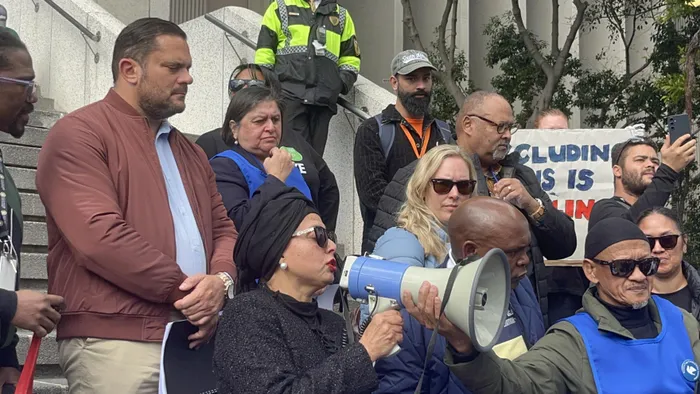
Speaking on the megaphone is Marlene le Roux, director of the Artscape Theatre Centre. Behind her is mayoral committee member for urban mobility Rob Quintas, and next to her is Michelle Botha, chairwoman of the Western Cape Network on Disability.
Image: Fouzia Van Der Fort
During the protest, GOOD proportional representation (PR) councillor Roscoe Palm, from Walmer Estate, challenged mayoral committee member for urban mobility, Rob Quintas, to travel from his Hout Bay home blindfolded to his place of work on a MyCiti bus.
He said that while people were wheelchair bound, they stood and walked to have their voices heard.
"How many of us found it here, to come here, to wait here to be inaccessible? Every single one of us," he said.
Mr Palm said that every single decision made by the City was political.
"A budget decision is a political decision to cut this Dial-a-Ride," he said.
He said they were there against the "political orthodoxy that cuts away the lives and livelihoods of the disabled, the differently abled, the others".
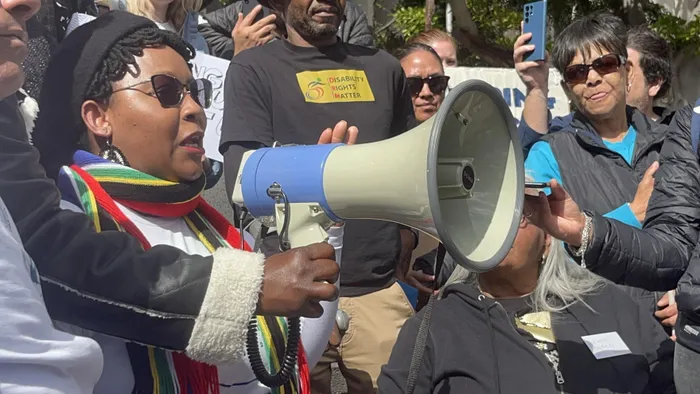
Notukela Makhohliso, social entrepreneur, educator, and founder of the Notukela Foundation Institute (NFI) and member of ActionSA social development.
Image: Fouzia Van Der Fort
Activist Anthony Ghillino, from Fish Hoek, a prominent South African disability rights advocate and the general manager of the QuadPara Association Western Cape (QAWC), offered Mr Quintas a wheelchair to see "how you get from your home to the city".
He called on all decision makers to sit around the table, including the national government, to make a concerted effort to help people with disabilities with access to transport.
According to the memorandum handed over to the City by Michelle Botha, chairwoman of the Western Cape Network on Disability, the reduction of DaR services was unacceptable and demanded action.
The protest was a collection of organisations representing people with disabilities from across the Western Cape. It condemned the City's decision to scale back the DaR service.
"The CoCT has consistently directed persons with disabilities to this service, creating a justified dependency.
"To now dismantle this essential service without a viable, accessible alternative in place is a profound betrayal of trust and an abandonment of the CoCT's duty of care," read the memorandum.
They demanded full disclosure to the consultation process, including which disability sector organisations were consulted regarding the DaR scale-back, detailing the methods, dates and minutes of engagements.
They also want the immediate halt to "all cuts".
"All services must be fully reinstate to their previous operational levels until a proper, co-created interim plan is established and implemented," read the memorandum.
They want full financial and operational transparency; co-creation of an interim plan; and City-led advocacy for sustainable funding.
"We expect a written response to this memorandum and a confirmed meeting date for the week of 26 - 30 August 2025 to address these demands before the official cut date of 8 September," read the memo.
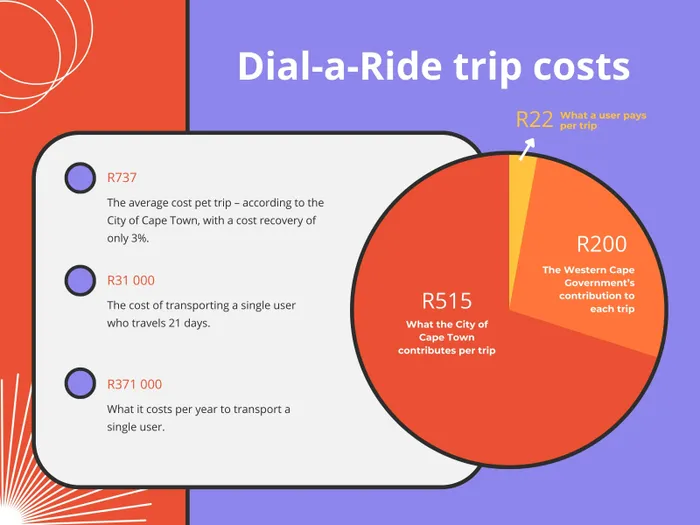
The City of Cape Town explains the cost per Dial-a-Ride user.
Image: Alicia English / Canva
Mr Quintas confirmed that the DaR was not ending but that changes would be implemented to ensure the long-term sustainability of the service.
As of Monday September 8, the service will be available during peak periods, from Monday to Friday, with minimal services on Saturdays, Sundays, and public holidays for those who need to go to work.
Eligible users will be able to book trips to work via the DaR app, website, or call centre, as is the case currently
Mr Quintas said that the DaR service was experiencing severe capacity challenges, with demand exceeding the available resources, and that the current budget deficit was close to R1 million a month.
"The annual budget for the service is R28.2 million, while the annual operating costs amount to R40 million currently," he said.
The service needs to be realigned to operate within the available budget
"The reality is that we cannot sustain an ever-expanding demand. The numbers speak for themselves," said Mr Quintas.
The DaR service was introduced in 2002 to assist people with physical impairments who could not use conventional public transport for their daily commute between home and work.
Over the past two decades, it has expanded to include trips to educational, medical, and recreational facilities, shopping centres, and private homes, while also extending its user base to people with other special needs.